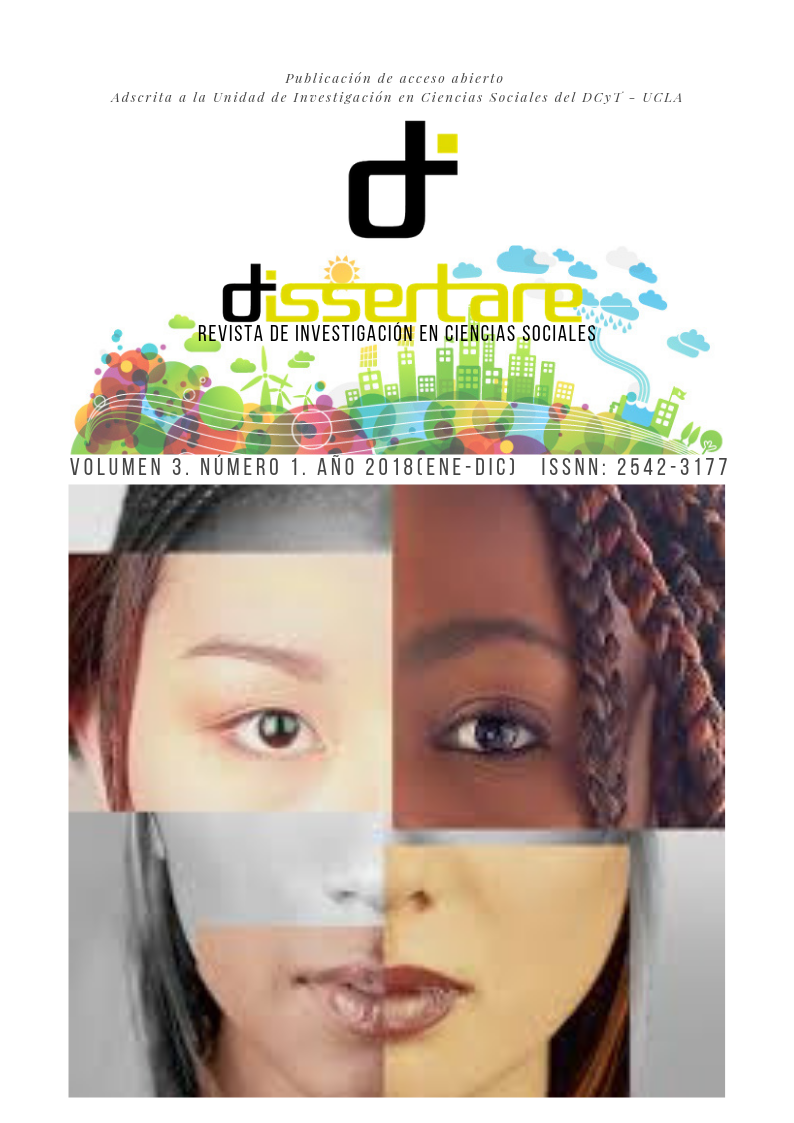From african as other to african as own: considerations about the african cultural heritage in Venezuela
Keywords:
african heritage, venezuelan identity, black culture in VenezuelaAbstract
The aim of this paper is to reflect about the African black heritage in Venezuela, as a contribution to the country's culture. Regarding the methodological perspective, critical hermeneutics is adopted, as a method of argumentation and exegesis as an argumentative technique, to discuss three aspects that are part of the African legacy and that account for our cultural identity: the historical-social one, the religious one and the linguistic one. Regarding the historical and social legacy, the author comments on the participation of the African people in Venezuelan history, incorporating the idea of "cimarronaje"; in attention to the magical-religious vision, it shows the thread of magic that surrounds the religious ideology of the black man; and on the subject of the linguistic legacy, it illustrates some terms of African origin that have remained in the current Spanish. The author concludes that to talk about the influence of black culture in Venezuela, we must discuss the multiple factors that influence the conformation of culture in this country, from diverse disciplinary visions and from cultural products of art, beyond the mere heritage or historical-anthropological legacy.
Downloads
References
Acosta S., M. (1984). Vida de los esclavos negros en Venezuela. Valencia, Venezuela: Vadell Hermanos Editores.
Ascencio, M. (2001). Entre Santa Bárbara y Shangó. La herencia de la plantación. Caracas, Venezuela: Facultad de Ciencias Económicas y Sociales de la Universidad Central de Venezuela. Editorial Tropykos.
Ascencio, M. (2004) ¿Ni Santa Bárbara ni Shangó? Reflexiones acerca desincretismo. Memorias de las IV Jornadas de Historia y religión, Universidad Católica Andrés Bello, pp. 57–64. Caracas, Venezuela.
Ascencio, M. (2005). Mundo, demonio y carne. Caracas, Venezuela: Alfadil.
Ascencio, M. (2016). De que vuelan, vuelan. Caracas, Venezuela: Editorial Alfa.
Chumaceiro, I. y Álvarez, A. (2004). El español, lengua de América. Caracas, Venezuuela: Facultad de Humanidades y Educación. Universidad Central de Venezuela.
Díaz, R. (1994). Historiografía de la esclavitud negra en América Latina: Temas y problemas generales. América Negra, 11-29.
Mosonyi, E. E. (2005). Revivir el patuá franco-criollo de Venezuela: Un desafío teórico y práctico». I Encuentro de Abuelos Creole y/o Patuá Parlantes de Venezuela y el Caribe. Güiria, Venezuela.
Mosonyi, E. E. (2008). Lanng-la osi kapab kreye teritwa kiltirel-li» (La lengua puede también criar su propio espacio cultural). II Encuentro de Abuelos Creole y/o Patuá Parlantes de Venezuela y el Caribe. Güiria, Venezuela.
Obediente-Sosa, E. (1997). Biografía de una lengua. Mérida, Venezuela: Universidad de Los Andes.
Pollak-Eltz, A. (1972). Vestigios africanos en la cultura del pueblo venezolano. Caracas, Venezuela: Universidad Católica Andrés Bello. Instituto Investigaciones Históricas.
Pollak-Eltz, A. (1977). Regards sur les cultures d'origine africaine au Vénézuela. Montréal, Canada: Centre de Recherches Caraïbes.
Pollak-Eltz, A. (1991). La Negritud en Venezuela. Caracas, Venezuela: Lagoven.
Ramos Guédez, J. M. (1985). El negro en Venezuela: aporte bibliográfico. Caracas: Instituto Autónomo Biblioteca Nacional y de Servicios de Bibliotecas, Gobernación del Estado Miranda. Venezuela.
Ramos Guédez, J. M. (2007). Francisco de Miranda y el problema de la esclavitud en Venezuela. En Humania del Sur. Año 2, Nº 3. Julio-diciembre, 2007. pp. 103-114. Recuperado de: http://www.saber.ula.ve/bitstream/123456789/24759/2/articulo7.pdf
República Bolivariana de Venezuela (2014). Ley Orgánica de Cultura. Gaceta Extraordinaria Nº 6.154. Caracas, Venezuela.
Published
How to Cite
Issue
Section
Derechos del/de autor/es a partir del año de publicación
Esta obra está bajo la licencia:
Creative Commons Reconocimiento-NoComercial-CompartirIgual 4.0 Internacional (CC BY-NC-SA 4.0)
Las opiniones expresadas por los autores no necesariamente reflejan la postura del editor de la publicación ni de la UCLA. Se autoriza la reproducción total o parcial de los textos aquí publicados, siempre y cuando se cite la fuente completa y la dirección electrónica de esta revista. Los autores(as) tienen el derecho de utilizar sus artículos para cualquier propósito siempre y cuando se realice sin fines de lucro. Los autores(as) pueden publicar en internet o cualquier otro medio la versión final aprobada de su trabajo, luego que esta ha sido publicada en esta revista.





